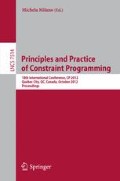Abstract
Two competing approaches to handling complex constraints in satisfaction and optimization problems using SAT and LCG/SMT technology are: decompose the complex constraint into a set of clauses; or (theory) propagate the complex constraint using a standalone algorithm and explain the propagation. Each approach has its benefits. The decomposition approach is prone to an explosion in size to represent the problem, while the propagation approach may require exponentially more search since it does not have access to intermediate literals for explanation. In this paper we show how we can obtain the best of both worlds by lazily decomposing a complex constraint propagator using conflicts to direct it. If intermediate literals are not helpful for conflicts then it will act like the propagation approach, but if they are helpful it will act like the decomposition approach. Experimental results show that it is never much worse than the better of the decomposition and propagation approaches, and sometimes better than both.
Access this chapter
Tax calculation will be finalised at checkout
Purchases are for personal use only
Preview
Unable to display preview. Download preview PDF.
References
Asín Achá, R., Nieuwenhuis, R.: Curriculum-based course timetabling with SAT and MaxSAT. Annals of Operations Research, 1–21 (February 2012)
Mcaloon, K., Tretkoff, C., Wetzel, G.: Sports league scheduling. In: Proceedings of the 3th Ilog International Users Meeting (1997)
Abío, I., Deters, M., Nieuwenhuis, R., Stuckey, P.J.: Reducing Chaos in SAT-Like Search: Finding Solutions Close to a Given One. In: Sakallah, K.A., Simon, L. (eds.) SAT 2011. LNCS, vol. 6695, pp. 273–286. Springer, Heidelberg (2011)
Warners, J.P.: A Linear-Time Transformation of Linear Inequalities into Conjunctive Normal Form. Information Processing Letters 68(2), 63–69 (1998)
Bailleux, O., Boufkhad, Y.: Efficient CNF Encoding of Boolean Cardinality Constraints. In: Rossi, F. (ed.) CP 2003. LNCS, vol. 2833, pp. 108–122. Springer, Heidelberg (2003)
Eén, N., Sörensson, N.: Translating Pseudo-Boolean Constraints into SAT. Journal on Satisfiability, Boolean Modeling and Computation 2, 1–26 (2006)
Asín, R., Nieuwenhuis, R., Oliveras, A., Rodríguez-Carbonell, E.: Cardinality networks: a theoretical and empirical study. Constraints 16(2), 195–221 (2011)
Nieuwenhuis, R., Oliveras, A., Tinelli, C.: Solving SAT and SAT Modulo Theories: From an abstract Davis–Putnam–Logemann–Loveland procedure to DPLL(T). Journal of the ACM, JACM 53(6), 937–977 (2006)
Ohrimenko, O., Stuckey, P., Codish, M.: Propagation via lazy clause generation. Constraints 14(3), 357–391 (2009)
Schutt, A., Feydy, T., Stuckey, P.J., Wallace, M.G.: Why Cumulative Decomposition Is Not as Bad as It Sounds. In: Gent, I.P. (ed.) CP 2009. LNCS, vol. 5732, pp. 746–761. Springer, Heidelberg (2009)
Aloul, F.A., Ramani, A., Markov, I.L., Sakallah, K.A.: Generic ILP versus specialized 0-1 ILP: an update. In: Pileggi, L.T., Kuehlmann, A. (eds.) 2002 International Conference on Computer-aided Design, ICCAD 2002, pp. 450–457. ACM (2002)
Bryant, R.E., Lahiri, S.K., Seshia, S.A.: Deciding CLU Logic Formulas via Boolean and Pseudo-Boolean Encodings. In: Proc. Intl. Workshop on Constraints in Formal Verification (September 2002); Associated with Intl. Conf. on Principles and Practice of Constraint Programming (CP 2002)
Bailleux, O., Boufkhad, Y., Roussel, O.: A Translation of Pseudo Boolean Constraints to SAT. Journal on Satisfiability, Boolean Modeling and Computation, JSAT 2(1-4), 191–200 (2006)
Abío, I., Nieuwenhuis, R., Oliveras, A., Rodríguez-Carbonell, E.: BDDs for Pseudo-Boolean Constraints – Revisited. In: Sakallah, K.A., Simon, L. (eds.) SAT 2011. LNCS, vol. 6695, pp. 61–75. Springer, Heidelberg (2011)
Manolios, P., Papavasileiou, V.: Pseudo-boolean solving by incremental translation to SAT. In: Formal Methods in Computer-Aided Design, FMCAD (2011)
Tseitin, G.S.: On the Complexity of Derivation in the Propositional Calculus. Zapiski Nauchnykh Seminarov LOMI 8, 234–259 (1968)
Bryant, R.E.: Graph-Based Algorithms for Boolean Function Manipulation. IEEE Trans. Computers 35(8), 677–691 (1986)
Mayer-Eichberger, V.: Towards Solving a System of Pseudo Boolean Constraints with Binary Decision Diagrams. Master’s thesis, Lisbon (2008)
Tani, S., Hamaguchi, K., Yajima, S.: The Complexity of the Optimal Variable Ordering Problems of Shared Binary Decision Diagrams. In: Ng, K.W., Balasubramanian, N.V., Raghavan, P., Chin, F.Y.L. (eds.) ISAAC 1993. LNCS, vol. 762, pp. 389–398. Springer, Heidelberg (1993)
Bofill, M., Nieuwenhuis, R., Oliveras, A., Rodríguez-Carbonell, E., Rubio, A.: The Barcelogic SMT Solver. In: Gupta, A., Malik, S. (eds.) CAV 2008. LNCS, vol. 5123, pp. 294–298. Springer, Heidelberg (2008)
Koshimura, M., Zhang, T., Fujita, H., Hasegawa, R.: Qmaxsat: A partial max-sat solver. JSAT 8(1/2), 95–100 (2012)
Martins, R., Manquinho, V., Lynce, I.: Parallel Search for Boolean Optimization. In: RCRA International Workshop on Experimental Evaluation of Algorithms for Solving Problems with Combinatorial Explosion (2011)
Anbulagan, Grastien, A.: Importance of Variables Semantic in CNF Encoding of Cardinality Constraints. In: Bulitko, V., Beck, J.C. (eds.) Eighth Symposium on Abstraction, Reformulation, and Approximation, SARA 2009. AAAI (2009)
Manquinho, V., Marques-Silva, J., Planes, J.: Algorithms for Weighted Boolean Optimization. In: Kullmann, O. (ed.) SAT 2009. LNCS, vol. 5584, pp. 495–508. Springer, Heidelberg (2009)
Silverthorn, B., Miikkulainen, R.: Latent class models for algorithm portfolio methods. In: Proceedings of the Twenty-Fourth AAAI Conference on Artificial Intelligence (2010)
Author information
Authors and Affiliations
Editor information
Editors and Affiliations
Rights and permissions
Copyright information
© 2012 Springer-Verlag Berlin Heidelberg
About this paper
Cite this paper
Abío, I., Stuckey, P.J. (2012). Conflict Directed Lazy Decomposition. In: Milano, M. (eds) Principles and Practice of Constraint Programming. CP 2012. Lecture Notes in Computer Science, vol 7514. Springer, Berlin, Heidelberg. https://doi.org/10.1007/978-3-642-33558-7_8
Download citation
DOI: https://doi.org/10.1007/978-3-642-33558-7_8
Publisher Name: Springer, Berlin, Heidelberg
Print ISBN: 978-3-642-33557-0
Online ISBN: 978-3-642-33558-7
eBook Packages: Computer ScienceComputer Science (R0)

